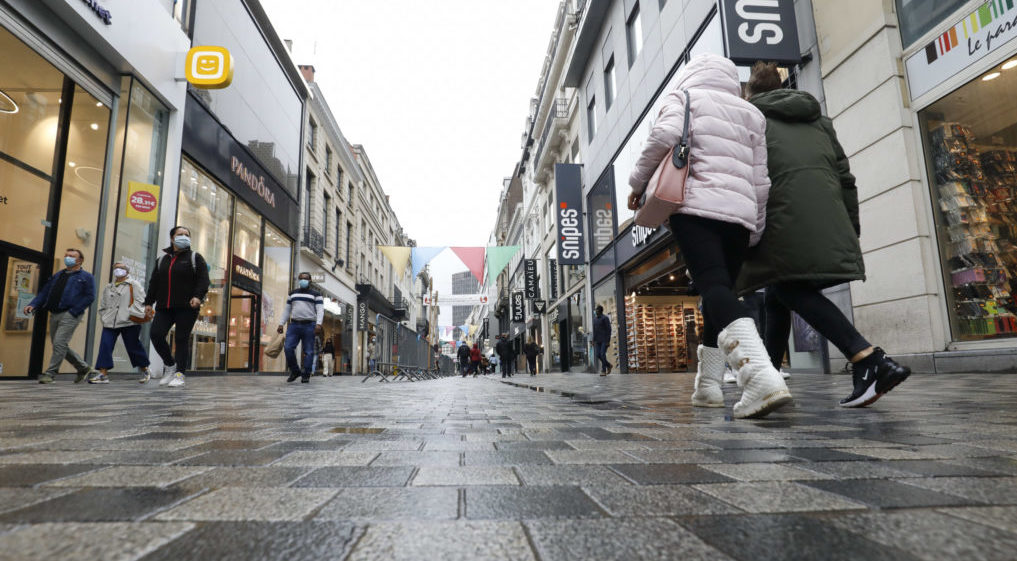With empty retail spaces, temporary outlet shops and ‘for rent’ signs, many are saying that Belgium’s most famous shopping street, the Rue Neuve in the centre of Brussels, has lost its charm.
What used to be one of the beating hearts of the city has, over time, turned into an increasingly less busy and unattractive street, which leaves most visitors unimpressed.
While Covid-19 played a role in the diminishment of its central role in Brussels shopping, high rent and inaccessibility also play a role in its decline in popularity among shoppers.
Nostalgia
The street once used to be lively day and night, in the 1970s and 80s. “I went to the cinema there, there was just a record store and a bookstore in the street at the time,” says Gino Van Ossel, professor of retail at the Vlerick Business School.
But nowadays, nightlife can no longer be found on Rue Neuve, and the existing retail spaces are no longer as popular. Out of the 92 shops in the street, at least 15 are empty, Bruzz reports. Another five buildings are under construction.
According to Benjamin Wayes, studying Brussels trade at ULB, construction works are not necessarily a bad sign. “It often happens because there is a new tenant. But even if you don’t count those buildings, the vacancy in the street itself is still much larger than is healthy.”
Disproportionate rent
The street that used to be able to charge some of the highest rent in the country now struggles to fill its premises. Quentin Huet, the spokesperson for Shopera, which mainly unites large shops in the centre, points to the Covid-19 crisis. “It caused a real shock.”
The rental price reflects the turnover that can be achieved in a certain place. With fewer customers during the pandemic, that immediately decreased. “Having far fewer customers led to a period of tension between the tenants and owners in the street. Some have come to an agreement, others have left.”
But, Huet says, that period is now behind us. “Plus, the customers are coming back.” Figures from hub.brussels show that the number of pedestrians in the street is almost back to pre-pandemic levels.
Still, the barometer shows 10% fewer sales than before Covid-19. “Pedestrians aren’t necessarily customers. Due to the energy crisis, people are buying fewer non-essential products. That is not a dream scenario, but also not a catastrophe.”
Trading experts, on the other hand, are more cautious. “There is more going on here than corona,” says Benjamin Wayens, who studies trade at ULB. He points out that shopping for clothing is in decline. “You have the pressure of cheap fast fashion and the online market that continues to gain in importance.”
In addition, many clothing stores have discovered that they are able to sell as much at cheaper locations that are not directly in the city centre. "It is therefore logical that a store such as H&M, which used to have up to three stores in the street, will be reducing the number of stores at one location"
Competing shopping malls
Meanwhile, at City 2, the shopping mall at the end of the street, virtually no premises are empty. At the same time The Mint, the mall on the other side of the street at Place de Monnaie, and the pedestrian zone on Boulevard Anspach are also causing trade to shift in that direction.
“City 2 functions there as a customer vacuum cleaner,” Wayens and Van Ossel agree. “And the side of City 2 and Inno feels a bit like a blind facade. The rent has always been lower in that part.”
Buying time
Like Huet, the ULB professor sees that a lot revolves around rents. “Quite a few owners are stubbornly holding on to their price, in the hope that everything will be like a few years ago. There are several things at play here. Don’t forget that the value of a building is also defined by the amount of rent you can ask.”
Van Ossel agrees. “Quite a few owners don't want to compromise, hence the many outlets and pop-ups, it’s a way to buy time. But I do see rents falling in the coming years. If only because telework is here to stay and the absent commuter often spends more than the local population.”
Non-Brussels residents stay away
Besides the Covid-19 crisis, local salespeople notice that there is more to it. Distant customers, coming from outside the city, also seem to stay away.
Frédéric Chladiuk runs the Western store, the epitome of a niche business that relies on customers from all over the country. “Brussels is dead,” he says. “People from outside don't come here anymore. They can’t get there by car anymore, and soon the parking spaces in the street here will also be overhauled.”
The criticism of Rue Neuve no longer being accessible from outside Brussels is loud and clear. While Huet understands, he does not agree. “You can get here very quickly. Via Central Station, North Station, by metro or if necessary in one of the many car parks, along the Kleine Ring or in the centre.”
Potential for revival?
Whether customers will find their way back to Rue Neuve remains a mystery, mainly depending on rental prices.
“Rental prices will fall, which means that the current vacancy rate will not continue,” Van Ossel predicts. He also expects the current emphasis on fashion will diminish. “I expect more shops that are explicitly aimed at the city dweller, such as a store with smaller furniture.”
Shopera manager Huet hopes to see the shopping street resuscitated outside of shopping hours, too. “Pedestrian zones should also be alive at night,” he says. “There is room for this in the streets around Rue Neuve.”

